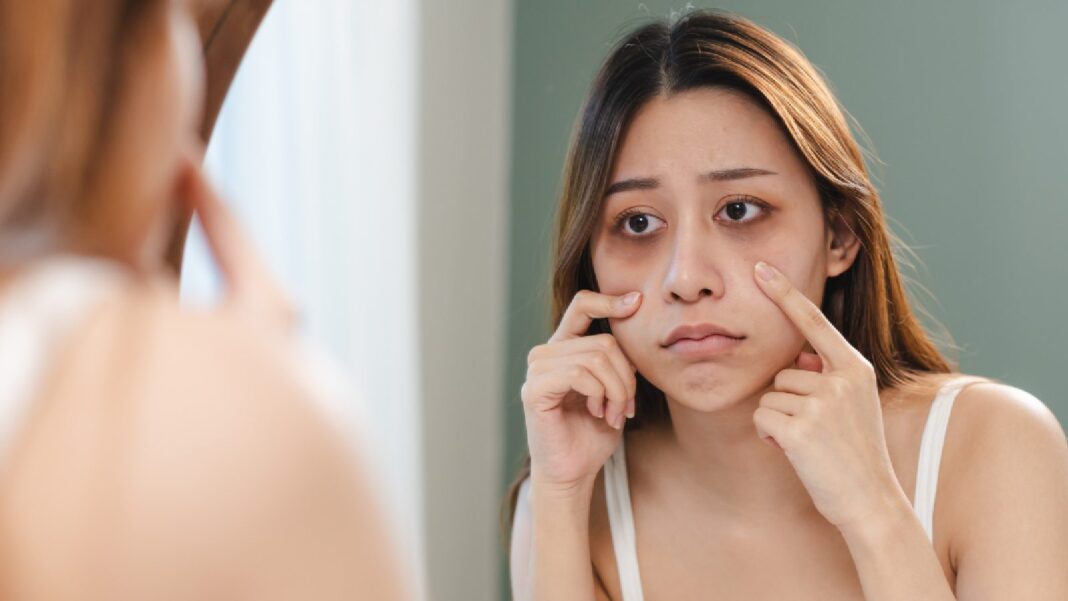under-eye pigmentation, under-eye dark circles, pigmentation, home remedies for pigmentation, home remedies for under-eye pigmentation, how to get rid of pigmentation, pigmentation under eyes, how to remove dark circles under eyes, skincare, dark under eyes, under eyes, healthshots
As you age, you may observe noticeable changes in your skin colour. You may witness some dark spots, patches, or under-eye circles. While these circles can indicate fatigue, dehydration, and insufficient sleep, they might also stem from hyperpigmentation. Under eye pigmentation involves an excess of darker pigment than the surrounding skin. Although they aren’t typically a cause for concern, you may want to lighten their appearance. Here are some effective home remedies for addressing under-eye pigmentation.
What causes pigmentation?
Pigmentation is primarily caused by an increased production of melanin in the skin. It causes skin discolouration, leaving dark spots and patches on the skin. Sun exposure is a common cause of skin pigmentation. When your skin is exposed to sunlight or ultraviolet (UV) radiation, your body produces melanin to defend itself against the harmful rays. This may make the skin more pigmented. Apart from this, hormonal changes, genetics, and certain medication can also increase the risk of pigmentation. Imbalances in melanin production may lead to conditions like hyperpigmentation (excess pigment) or hypopigmentation (insufficient pigment), resulting in discolouration.
5 home remedies for under eye pigmentation
1. Apple cider vinegar (ACV)
Apple cider vinegar is rich in anti-bacterial and antifungal properties, which are extremely beneficial for removing spots and patches. Moreover, ACV contains malic acid, which decreases melanin production and helps control the appearance of brown spots and hyperpigmentation. ACV also exfoliates your skin, giving you a brighter skin tone.

How to apply: Mix 2 tablespoons of apple cider vinegar with 1 tablespoon of gram flour together. Now add 1 tablespoon of honey to it and mix it properly. Apply this mixture on the freckles visible under the eyes. Now, leave it on for 10 minutes, massage the dry mask for 2 to 3 minutes, and then wash your face
2. Mulethi (licorice)
Mulethi is a popular remedy in Ayurveda. A 2013 study published by the National Library of Medicine found that it has anti-inflammatory, anti-microbial, and anti-ageing properties that are known to be beneficial for reducing wrinkles and fine lines. It also helps reduce the symptoms of skin conditions like pigmentation, and preventing sun damage. It can also control acne and enhance skin complexion.
How to apply: To prepare a smooth paste, mix licorice powder with turmeric. Now add rose water to it to make it smooth. Now, apply the mixture to your skin and leave it on for 10–15 minutes. You can also add sandalwood powder to this mixture because sandalwood is also good for pigmentation removal.
Health Shots Recommends: 5 best skin pigmentation creams for flawless skin
Select Topics of your interest and let us customize your feed.
3. Green tea bags
Placing green tea bags under the eyes reduces inflammation and puffiness. Due to their high flavonoid content, green tea bags may help improve skin elasticity and reduce dark circles as well as pigmentation. Using green tea bags is a better choice because green tea is known to be an effective remedy that helps prevent skin redness caused by UV radiation.
How to apply: Brew green tea bags and let them cool. Place a bag under each eye for 10–15 minutes, ensuring they cover the dark circles. Gently press the bags to release the antioxidant-rich tea. Dispose of the used tea bags and moisturise your skin.
4. Potato slices
Potato slices are a natural remedy for pigmentation issues. It contains enzymes and vitamin C that may help lighten dark spots and even out skin tone. The mild acidic properties may exfoliate dead skin cells, promoting a brighter complexion. It can also nourish your skin, all thanks to vitamin A, vitamin C, starch, and enzymes.
How to apply: First of all, wash the potatoes, peel them, and then cut them into slices. Put a few drops of rose water on potato slices and rub it for some time on the blemishes visible under the eyes. You can also slice a raw potato and place the slices on the affected areas for 15-20 minutes.

5. Papaya
Papaya, rich in enzymes like papain and antioxidants, is well known for its potential benefits in addressing pigmentation issues. Papain exfoliates dead skin cells, aiding in cell turnover and reducing dark spots. The vitamin A and C content in this fruit helps lighten pigmentation and promote a more even skin tone. Additionally, papaya’s moisturising properties may contribute to a healthier complexion.
How to apply: To use papaya for pigmentation, mash a ripe papaya and add the goodness of aloe vera gel to it. Mix both ingredients well. Now, apply the mixture to the affected areas, leaving it on for 15-20 minutes before rinsing. It will leave your skin looking spotless and glowing.
7 other skincare tips to prevent pigmentation
- Shield your skin from UV rays with sunscreen (SPF 30+) and wear full-sleeved clothes.
- Use gentle skincare products to prevent irritation and pigmentation.
- Moisturise your skin properly to prevent dehydration, reducing the risk of pigmentation.
- Consume a balanced diet rich in antioxidants to promote skin tone.
- Remove dead skin cells through exfoliation, preventing pigmentation buildup.
- Apply vitamin C or retinol-based creams to target pigmentation.
- Consult with a dermatologist if nothing works.
A regular application of these home remedies could potentially reduce pigmentation over time. However, results vary, and it’s crucial to consult with a dermatologist for severe pigmentation!








